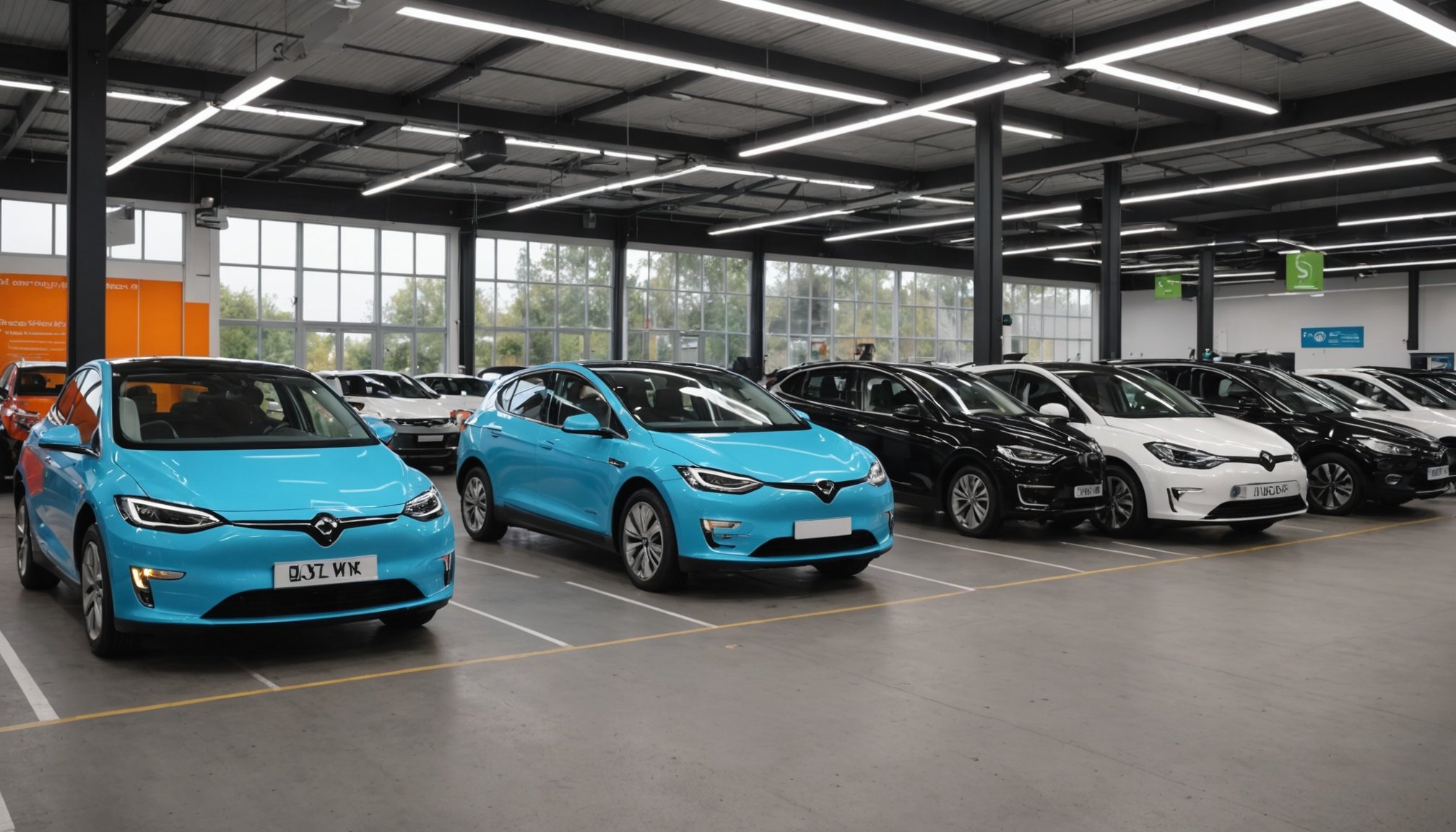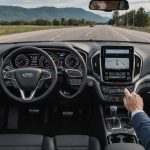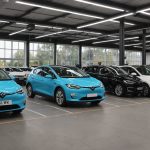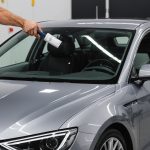The automotive industry is undergoing a transformative shift as electric vehicles (EVs) gain traction globally. With rising concerns over emissions, consumer preferences are evolving, compelling traditional car dealerships in the UK to adapt or risk obsolescence. This article explores how the introduction of electric vehicles influences car sales, dealership operations, and overall market dynamics.
The Rise of Electric Vehicles in the UK Market
In the UK, the surge in popularity of electric vehicles is evident. Sales figures indicate that the market for EVs has grown significantly over recent years. According to the latest statistics, the sale of electric cars now accounts for a substantial portion of the total vehicle sales. This trend is not merely a fad; it’s a response to the stringent emissions regulations imposed by the government, alongside the public’s increasing awareness of environmental issues.
Also to discover : Navigating the New UK Car Seat Regulations: What Parents with Infants Need to Know for Safe Travel
One of the primary factors driving this growth is the price of electric vehicles. While they were once viewed as prohibitively expensive, advancements in battery technology have made them more affordable. Furthermore, government incentives and subsidies for EV buyers have made the financial decision to switch from internal combustion engine (ICE) vehicles to EVs more appealing. As consumers seek to lower their energy expenses and embrace sustainable practices, the demand for electric vehicles is expected to rise even further.
This change poses a challenge for traditional car dealerships in the UK. Many dealerships have historically focused on selling ICE models and may lack the necessary infrastructure to support the new generation of EVs. As sales of electric vehicles increase, dealerships must pivot their strategies to accommodate this shift in consumer demand. This includes providing charging solutions and training staff on electric vehicles to effectively communicate benefits to potential buyers.
Also read : Ultimate Guide: Selecting the Top Eco-Conscious Car Wash Products for UK Climates
The Impact on Traditional Dealership Operations
The introduction of electric vehicles is reshaping how traditional car dealerships operate. One significant impact is the need for dealerships to rethink their sales strategies. The traditional model of selling ICE vehicles, which often relies on the performance and aesthetic appeal of cars, is less effective for EVs. Customers are increasingly interested in factors such as battery life, charging speed, and the overall energy ecosystem.
As a result, dealerships must invest in training their sales teams on the specific features and benefits of electric vehicles. This includes understanding the nuances of charging infrastructure and how to articulate the long-term savings associated with owning an EV compared to a traditional car. Knowledgeable staff can instill confidence in potential buyers, making them more likely to consider an electric vehicle.
Moreover, the physical layout of the dealership may need to change. Dealerships are beginning to incorporate charging stations into their premises to facilitate customer test drives and showcase the practicality of owning an EV. This integration helps create a seamless experience for customers, allowing them to see firsthand how easy it can be to charge an electric vehicle. Additionally, creating dedicated sections for electric cars within the dealership can highlight the brand’s commitment to sustainability, appealing to environmentally conscious buyers.
However, this transformation comes with challenges. The initial investment in charging infrastructure and employee training can be significant. Dealerships must weigh the costs against the potential benefits of tapping into the growing electric vehicle market. As such, traditional dealerships must evaluate their operational models and make informed decisions to remain competitive.
Consumer Behavior and Preferences
Understanding consumer behavior is crucial for traditional car dealerships as electric vehicles gain popularity. As more people become aware of the benefits of EVs, this shift in mindset is influencing purchase decisions. Factors such as environmental impact, cost savings on fuel, and governmental policies are driving consumers towards electric vehicles.
For many buyers, the initial price of an electric vehicle can be a deterrent. However, as consumers become more informed about the long-term savings on fuel and maintenance costs, they often reconsider their options. Additionally, the decreasing costs of batteries and increased availability of affordable EV models are making these cars more accessible. Dealerships that offer transparent pricing and financing options will likely attract more customers.
Another aspect to consider is the role of charging infrastructure. A robust network of public and private charging stations is crucial for potential buyers. Many consumers want reassurance that they can easily charge their electric vehicles at home and on the go. As a result, dealerships that can provide information about local charging stations and home charging solutions will have a competitive edge.
Moreover, as the UK government continues to promote electric vehicles through initiatives such as the ban on new ICE vehicle sales by 2030, consumer momentum towards EVs is expected to accelerate. Dealerships must not only acknowledge these trends but also actively engage with their customers to understand and meet their needs.
Competition and Collaboration in the EV Market
The shift towards electric vehicles has led to increased competition in the automotive market. Traditional dealerships are now contending not only with other dealerships but also with new entrants focused exclusively on EVs. Companies like Tesla have disrupted the market by offering a direct sales model that bypasses traditional dealerships altogether. This has forced established dealerships to adapt quickly to maintain their market share.
In response to this competition, some traditional dealerships are exploring collaboration with EV manufacturers. Partnering with electric vehicle brands can enable dealerships to offer a broader range of options to consumers. This strategy can also enhance the dealership’s credibility in the EV market, as consumers are more likely to trust authorized dealers for their vehicle purchases.
Additionally, forming alliances with charging network providers is essential. By offering customers access to charging solutions, dealerships can enhance the overall buying experience and help customers feel more secure about transitioning to an electric vehicle. This can be a key selling point, showcasing the dealership’s commitment to supporting sustainable transportation.
As the electric vehicle market continues to expand, dealerships must stay informed about emerging technologies and market trends. Understanding how to navigate this evolving landscape will be crucial for long-term success. By embracing innovation and fostering partnerships, traditional dealerships can position themselves as valuable players in the rapidly changing automotive industry.
The introduction of electric vehicles is undeniably reshaping the landscape of traditional car dealerships in the UK. As consumer demand shifts towards more sustainable options, dealerships must adapt their operations, sales strategies, and customer engagement approaches. Embracing the benefits of electric vehicles and investing in appropriate infrastructure and training can lead to success in this new marketplace.
The transition to electric vehicles presents both challenges and opportunities for traditional dealerships. By understanding the preferences of modern consumers and staying competitive in an evolving market, dealers can thrive in the age of electric vehicles. As the UK continues to push for greener transportation solutions, the future of traditional car dealerships will depend on their ability to innovate and align with the new automotive era.











